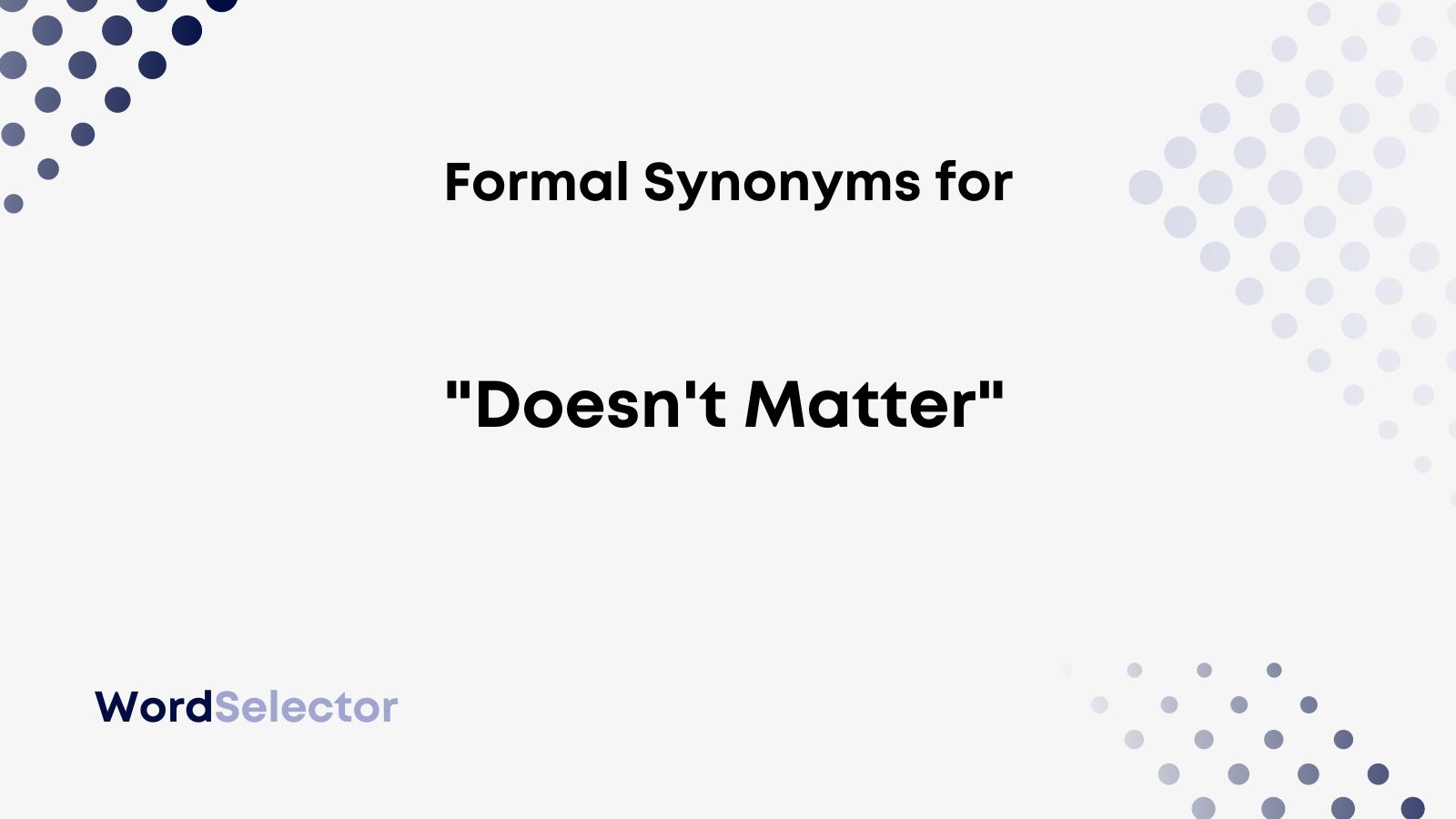Are you trying to understand how to professionally say “doesn’t matter”?
Perhaps you want to disregard something, but you’re worried the phrase is too rude or informal to include in emails.
Luckily, that’s what we’re here to help you with.
This article will teach you a fancy way to say “doesn’t matter” to help you spice things up.
Other Ways to Say “Doesn’t Matter”
- Irrelevant
- Of no consequence
- Inconsequential
- Immaterial
- Unimportant
- Trivial
- Negligible
- Insignificant
- Indifferent
- Irrespective
- Disregardable
- Meaningless
- Nonsignificant
- Nonessential
- Unimposing
KEY TAKEAWAYS
- “Doesn’t matter” is correct, but it’s too informal to include in professional situations.
- “Irrelevant” is great to use as a one-word, formal synonym if that suits your emails better.
- Try “of no consequence” for a phrasal alternative that works well in formal reports.
Keep reading to learn a professional way to say “doesn’t matter.” We’ve expanded on the best two options from the list above to help you understand more about them.
You can also read the final heading to learn whether it’s correct to say “doesn’t matter.” So, if you think that’s more applicable to your needs, feel free to skip ahead!
Irrelevant
You can use “irrelevant” as another word for something that doesn’t really matter.
This is an effective way to show unenthusiasm towards something that you don’t think is important.
For instance, you can use it when writing to an employee.
If they’re fixated on something that you don’t think will help your company, you can use something like this.
After all, it’s direct and sincere. It lets an employee know that they might be wasting their time on something, so it gives them a chance to move on quickly.
You may also check out this sample email to learn more about how it can work:
Dear Harold,
I’m afraid this is irrelevant to what we’re looking for.
So, I’d prefer it if you could stop looking into it and focus on something more productive.
Thank you so much,
Sarah Look
It’s also quite useful in formal reports.
It’s an excellent option if you’ve looked into something and decided that it’s irrelevant or has no bearing on the outcome of another situation.
This only works if you’ve done ample analysis on something and deemed it useless or unnecessary to look into further.
You can check out how this works by reviewing the following report sample:
It’s clear that this situation will be irrelevant to the outcome. Therefore, it does not require further monetary aid.
Of No Consequence
You can also use “of no consequence” as another way to say “doesn’t matter.”
This one is a phrasal alternative, so it’s a good choice to sound sincere and respectful.
Most of the time, when using something like this, it makes you sound confident. The more sure of yourself you are, the more seriously people will take you in emails.
So, you might want to use this when conversing with a business partner. It allows you to explain how you think something won’t affect your business, so you don’t know why you need to focus on it.
Check out the following email sample to learn a bit more about how it can work:
Dear Ms. Clark,
I believe this is of no consequence to either of our goals.
For now, it’s worth looking into a different situation to see what we can learn.
Yours,
William Shatner
You may also write something like this in a report about a competitor’s product. It’s a good way to announce something to your employees to let them know that a competitor will not affect you.
You may also check out this example to learn a bit more about how it can work:
Their product is of no consequence to the release of ours. Please stand your ground and show them that we’re proud of this.
Is It Correct to Say “Doesn’t Matter”?
It is correct to say “doesn’t matter.”
However, it’s informal. Also, it’s rude. So, you might be better off avoiding it in most formal cases.
With that said, the phrase is still correct.
If you’re going to use it, we certainly recommend keeping it in text messages to friends or people you have a closer relationship with.
You can review this example to learn a bit more about how it can work:
I’m afraid most of this doesn’t matter to me. So, I don’t see why I need to give you any advice on it.
Before you leave us, make sure you bookmark this page! Then, you can remind yourself of the best synonyms for “doesn’t matter” that work best in formal contexts.

